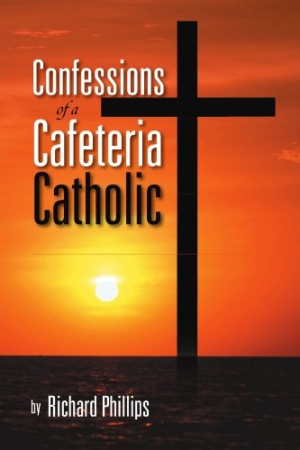Confessions of a Cafeteria Catholic
“My faith is based on some principles that I learned growing up, adjusted by a realization that those principles may be affected by other people and finally attuned to my own grasp of what is real for me personally.” With that summary, Richard Phillips gives fair warning that his faith journey is a work-in-progress. In Confessions of a Cafeteria Catholic, he invites the reader to join him as he evaluates, questions, and wonders about the teachings and experiences that have shaped his faith.
Phillips, a cradle Catholic, married a Lutheran, and he and his wife raised their children as Lutherans. His relationship with Catholicism has been hot and cold. At times, he has embraced the church, but he has considered abandoning it, too, preferring to make his own choices from the cafeteria of theology. It is a mixture of beliefs and life experiences that compels him to constantly question the validity of his religious principles.
Phillips admits that there is no unifying thesis or any particular order to his essays. Each of the forty-five chapters is a separate essay in which Philips presents his thoughts on whatever topic struck his fancy at a given time, from forgiveness and demons to the Eucharist and prayer. The chapters vary from a single paragraph to five pages in length.
The strength of Phillips’s writing is its simplicity. He does not try to come across as a scholarly theologian or even a giver of advice. His musings are full of questions, not answers. His questions are not meant to tear down beliefs or degrade religion; instead, they challenge the reader to take a deeper look at longstanding concepts and decide for himself if a change in his own faith, whether minor or major, is appropriate.
Phillips can also be refreshingly candid. “I am in conflict. I would like to go to Confession, but some of the things the Church believes to be sinful I do not.” Such soul-baring admissions permeate the book, making the author’s thoughtful observations and thinking-out-loud style particularly effective.
The book would have benefitted from a few editorial tweaks. Many paragraphs are extremely long, which slows down the pace of the essays. In addition, Phillips’s interpretation of the Christmas story is uncharacteristically juvenile and should not have been included in the collection. None of these flaws, however, significantly detracts from the overall book.
Although some chapters address predominantly Catholic issues, Phillips’s diversity of experiences leads to plenty of thought-provoking and insightful ideas that non-Catholic readers may find valuable. Confessions of a Cafeteria Catholic can be described as a smorgasboard loaded with a wide variety of pleasing choices.
Reviewed by
Jeff Friend
Disclosure: This article is not an endorsement, but a review. The publisher of this book provided free copies of the book and paid a small fee to have their book reviewed by a professional reviewer. Foreword Reviews and Clarion Reviews make no guarantee that the publisher will receive a positive review. Foreword Magazine, Inc. is disclosing this in accordance with the Federal Trade Commission’s 16 CFR, Part 255.

